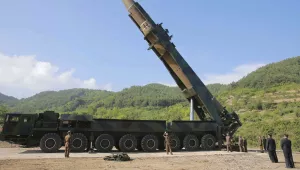Summary
The protection and advancement of the national security interests of the United States requires a greater investment than ever in alliances. In the intensely interconnected security environment of the 21st century, the view that alliances are encumbrances rather than enablers is flawed strategically. Alliances are the antithesis of altruism or passivity. They are a highly self-interested proposition in that they are an essential instrument for advancing American national security. Going forward, the purpose of alliances in U.S. national security policy must be fourfold: To generate capabilities that amplify American power; to create a basis of legitimacy for the exercise of American power; to avert impulses to counterbalance American power; and to steer partners away from strategic apathy or excessive self-reliance.
What does an alliance offer that the United States cannot obtain otherwise? Alliances are binding, durable security commitments between two or more nations. The critical ingredients of a meaningful alliance are the shared recognition of common threats and a pledge to take action to counter them. To forge agreement on threats, an alliance requires ongoing policy consultations that continually set expectations for allied behavior. In light of the unpredictable and amorphous nature of new security challenges, such consultations will be essential instruments of American leadership, especially with regard to building and maintaining consensus on ends and means. To generate the capacity to operate together, an alliance requires sustained preparations for combined action. What distinguishes an alliance from any other kind of cooperative relationship is the existence of interoperable military capabilities that enhance prevention, provide deterrence, and contribute to effective defense. In the past, such action has resided largely in the domain of military cooperation; in the future, it will extend to a much broader set of collaborative activities that only recently have come to be understood as vital to national security.
Alliances can range in their obligations from the most expansive—“an attack on one is an attack on all”—to guarantees that are more limited in ambition. Across all alliances, the ideal is the creation of an entity in which the sum of cooperation between or among the participating states will be greater than the sheer arithmetic addition of the constituent parts. At a minimum, allies are expected to take into consideration the perspectives and interests of their partners as they make foreign and defense policy choices. The first impulse of allies should be to turn to one another for support; the last impulse should be to go without or around an ally, or to oppose and seek to thwart an ally’s policy goals actively.
Alliances also create incentives for reaching multinational consensus. In the most effective alliances, participants benefit from a central coordinating mechanism that structures consultations and enables horse trading. Allies do not consider each policy issue narrowly on its own merits, but rather within the broader context of prior shared experience, concomitant items on the current agenda, and longer-term goals. Thus allies constantly are stimulated to consider how their interests dovetail with the interests of their partners in order to maximize support for their own priority initiatives.
The array of alliance relationships that the United States maintains today provides a strong foundation for the exercise of American influence. However, it needs to evolve in several critical dimensions to meet present and future needs. It must acknowledge that some traditional allies no longer depend on the United States for their survival as they did during the Cold War, and that the United States may depend more rather than less on its allies in Europe and Asia to achieve its global goals. Further, in the face of transnational dangers, the United States will need to promote alliances that are defined in broader terms than the classical geographically-based model. Transregional linkages among allies and alliances need to be forged in response to global threats. Finally, effective security cooperation necessitates a much wider embrace of governmental functions. A dense network of interactions will be required to deal with challenges such as proliferation and terrorism, which are less susceptible to traditional military tools and require intimate cooperation across previously “domestic” structures.
Some evidence suggests that a tactical course correction is underway in the second term of the Bush administration. The president and his senior advisors have signaled a renewed appreciation of the utility of partners in pursuing American foreign and defense policy goals. Examples include the transition of responsibility for some sectors of Afghanistan from U.S. forces to NATO forces, a qualified endorsement of the European Union diplomatic approach to addressing the Iranian nuclear program, and continued deference to the six-party process for North Korea. Some bilateral alliance relationships also have been strengthened, most notably ties between Washington and Tokyo, although others, such as the American bond with Turkey, remain severely strained. However, to meet the future requirements of its national security, the United States needs to move beyond case-by-case actions toward the strategic recognition that alliances are a net benefit. Long-term policies must be established to support and grow American alliances.
The United States should pursue an alliance strategy that is multifaceted, multilayered, and multi-yeared.This would entail a four-pronged approach: First, to build upon existing bilateral and multilateral alliance institutions, relationships, and capabilities; second, to promote the establishment of stronger ties that might become enduring alliances (both bilaterally and multilaterally) with several key countries and regions; third, to invest in peacetime security cooperation with countries that can be coaxed toward partnership and may in the future be capable of sustaining an alliance relationship; and fourth, to utilize the full spectrum of cooperative international arrangements that complement alliances.
To achieve an enduring sense of common interest and purpose, it will not be sufficient to flex American power and expect others to fall in line. The United States must find ways to transform its power into a magnetic force that draws peoples and nations to its goals. It will not serve American national security interests to disparage multilateralism, nor to abandon the pursuit of enduring ties in the illusory hope that less formal arrangements will provide both flexibility and sustained support. The United States must rebuild its alliances and innovate a new kind of connectivity across countries, institutions, and regions that result in a broadly-based alliance system that is far greater than the sum of its disparate parts. The United States also must remain committed to the nitty-gritty effort to make it possible for foreign forces to operate capably alongside American troops, and to establish mechanisms that permit more effective security cooperation with international institutions and nongovernmental organizations.
Please see the pdf below for the full text of this article:
Sherwood-Randall, Elizabeth. “Alliances and American National Security.” Strategic Studies Institute, U.S. Army War College, October 2006



